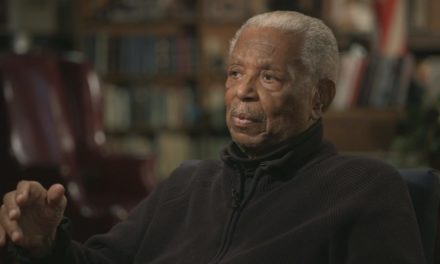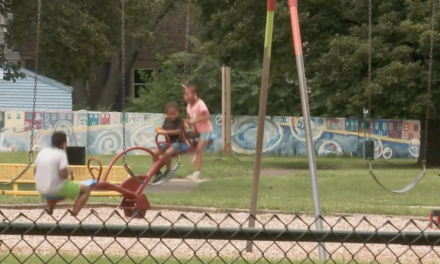As we bid farewell to 2023, it’s impossible not to reflect on the important stories that shaped the African American community this year. From commemorating the anniversary of a historic civil rights march to conversations around police brutality, the political heartbeat of hip-hop’s history, the restoration of a historic jazz club, and stories on Detroit’s Black church community, here are our top 10 stories from 2023.
Walking down memory lane: Two Detroit women reflect on attending the 1963 Walk to Freedom
In the sweltering heat of a vibrant Detroit summer, on June 23, 1963, a remarkable moment in American civil rights history unfolded at Cobo Hall as Dr. Martin Luther King Jr. delivered an early version of his iconic “I Have A Dream” speech. Two Detroit women, Dorothy Aldridge and Edith Lee-Payne, reflect on attending the Detroit Walk to Freedom 60 years ago, as well as the walk’s impact on their lives and its place in history.
Oscar-winning costume designer Ruth E. Carter exhibits ‘Black Panther,’ ‘Wakanda Forever’ costumes at The Wright Museum
Two-time Oscar-winning costume designer Ruth E. Carter, renowned for her work on iconic films like Black Panther, Malcolm X and Roots, has delved into the artistry of her designs in her exhibit at the Charles H. Wright Museum of African American History. The exhibit, “Ruth E. Carter: Afrofuturism in Costume Design,” is on display through March 31, 2024. It showcases the power of storytelling through costume design and honors ancient African cultures through Afrofuturistic pieces.
Tyre Nichols’ death: A roundtable about racism, police reform and racial trauma
After the death of Tyre Nichols, the 29-year-old Black man killed by five Black Memphis Police officers, another wave of nationwide protests and demonstrations against police brutality sparked in cities across the U.S., including the majority-Black city of Detroit. Host Stephen Henderson led a roundtable to discuss Nichols’ death, police reform and accountability, and the importance of checking your mental health in the wake of tragedy.
A Detroit woman found herself homeless after losing her husband to COVID-19
In Detroit, the intertwined issues of affordable housing and homelessness form a complex tapestry that weaves through the lives of its residents. For Tonya Hogan, that stability crumbled after losing her husband to COVID-19. Without him, Hogan found herself homeless, experiencing the challenges of trying to find quality housing again. Hogan delves into the challenges homeless people face as they navigate these profound hardships.
Historic Detroit jazz club, the Blue Bird Inn, set for grand revival by Detroit Sound Conservancy
The historic Blue Bird Inn jazz club on Detroit’s west side is getting a massive renovation, thanks to the nonprofit Detroit Sound Conservancy. The club, with its rich history dating back decades, has been a cradle of talent and creativity, hosting some of the most celebrated musicians in the genre. Community members shared what the rehab of the club will mean for the surrounding neighborhood.
Dr. Hasan Jeffries discusses hip hop’s history of politics and speaking out
Hip hop turns 50 this year. In celebration of the historic milestone, Dr. Hasan Jeffries, an associate professor of history at The Ohio State University, shares the history of political messages in hip hop, and how artists use the genre to speak out and express opposition to what’s going on in society and as a voice for the oppressed and marginalized.
Rhythms of change: Motown Museum reflects on recording civil rights history 60 years ago
Sixty years ago, Motown Records founder Berry Gordy made a pivotal decision to immortalize Dr. King’s messages on record albums during the civil rights movement. This decision marked a momentous intersection of music and activism, providing a platform for Dr. King’s inspirational words to reach a broader audience. Motown Museum CEO Robin Terry shares how the collaboration between Motown Records and the Civil Rights Movement continues to influence the museum’s present-day projects.
Black liberation & empowerment: The historical impact of Detroit’s Black churches
From serving as stations on the Underground Railroad to establishing schools and hospitals and hosting civil rights leaders, the Black Church in Detroit is an important part of Black liberation and empowerment. A Black Church pastor and a historian discuss the church’s origins and important roles in Black history, as well as the abolitionists and civil rights leaders who visited the churches and the impact the churches had in the African American community.
Detroit’s Black churches partner with city schools to champion students’ education
What role do Detroit’s Black churches play in the success of Detroit Public Schools and their students? American Black Journal’s “Black Church in Detroit” series examines the important role of the church as a champion for the city’s schools and students, and how the church fills the gaps, helps solve issues, and supports Detroit schools to make sure students can reach their full potential.
The Black Church in Detroit: Preachers’ kids
We don’t often hear the perspective that preachers’ kids have about growing up with a pastor as a parent. Three Detroit preachers’ kids reflect on the life lessons they learned from growing up with a pastor as a parent, the influence their fathers had on their present-day careers, and the legacies their fathers left behind in the church and community.
Stay Connected:
Subscribe to One Detroit’s YouTube Channel & Don’t miss One Detroit Mondays and Thursdays at 7:30 p.m. on Detroit Public TV, WTVS-Channel 56.
Catch the daily conversations on our website, Facebook, Twitter @DPTVOneDetroit, and Instagram @One.Detroit
View Past Episodes >
Watch One Detroit every Monday and Thursday at 7:30 p.m. ET on Detroit Public TV on Detroit Public TV, WTVS-Channel 56.





